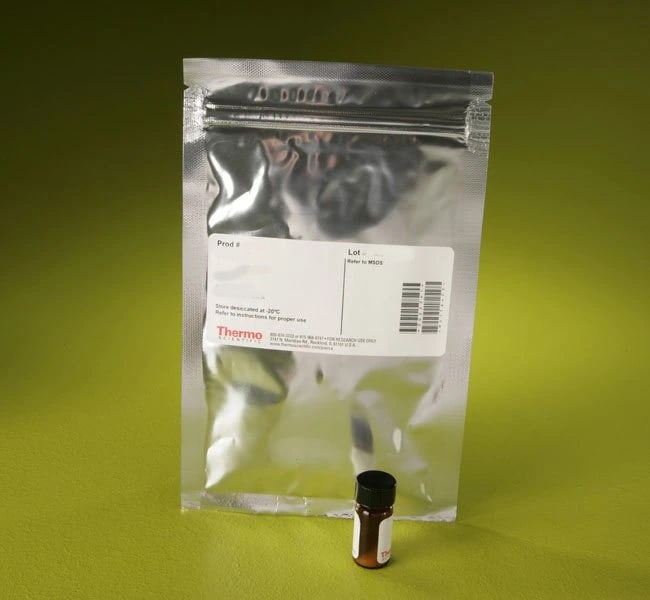Search Thermo Fisher Scientific

Thermo Scientific™
MS(PEG)8 甲基-PEG-NHS-酯试剂
Thermo Scientific Pierce MS(PEG)n reagents are methyl-terminated, polyethylene glycol compounds (n equals 4 to 24 PEG units) activated as NHS了解更多信息
货号 22509
价格(CNY)/ Each
价格5,060.00
您的价格登录登录以查看您的帐户定价。需要一个帐户?立即注册。
-
数量:
100 mg
价格(CNY)/ Each
价格5,060.00
MS(PEG)8 甲基-PEG-NHS-酯试剂
货号22509
价格(CNY)/ Each
价格5,060.00
-
Thermo Scientific Pierce MS(PEG)n reagents are methyl-terminated, polyethylene glycol compounds (n equals 4 to 24 PEG units) activated as NHS esters for covalent pegylation of primary amines on proteins (e.g., lysines) or assay surfaces.
Features of MS(PEG)8:
• NHS-activated for efficient PEGylation of primary amines at pH 7-9; reaction of NHS-ester group results in formation of stable, irreversible amide bonds
• Fully characterized PEGylation reagents with defined PEG chain lengths; molecules of discrete molecular weight for consistency of performance in protein-modification applications
• Provided as a series of 4, 8, 12 and 24 ethylene glycol units, enabling modification procedures to be optimized for a specific application while retaining all the benefits associated with protein PEGylation
• PEG spacer provides unique advantages, including increased stability, reduced tendency toward aggregation and reduced immunogenicity
• Easy-to-follow instructions increase the likelihood of a successful outcome
MS(PEG)n is the abbreviation for a set of compounds having polyethylene glycol (PEG) spacers with methyl (—CH3) and amine-reactive NHS-ester groups at opposite ends. The unbranched, hydrophilic, discrete-length molecules have the form Methyl-PEGn-NHS Ester, where the subscript 'n' denotes 4, 8, 12, or 24 ethylene glycol units. The N-hydroxysuccinimide (NHS) ester is spontaneously reactive with primary amines (—NH2), providing for efficient PEGylation of proteins, peptides and other amine-containing molecules or surfaces.
PEGylation Applications:
• PEGylate amine surfaces
• Add inert mass to proteins, immunogens, drug compounds and probes
• Improve solubility (decrease aggregation) of proteins or peptides without affecting function
• Protect proteins from proteolysis
Why PEGylate a protein or peptide?
PEG-containing reagents have been used to modify proteins to provide specific advantages. Protein PEGylation can improve the stability of the modified protein, protect it from proteolytic digestion, increase its half life in biological applications, mask it from causing an immunogenic response, decrease its antigenicity or potential toxicity, improve its solubility, diminish the potential for aggregation, and minimize interference for both in vitro and in vivo applications. Polyethylene glycol, also called polyethylene oxide (PEO), has these effects because it is nontoxic, nonimmunogenic, hydrophilic, water soluble and highly flexible.
Advantages of Discrete-length mPEG-NHS Ester Compounds
These reagents are specially synthesized as homogeneous compounds of discrete chain length and defined molecular weight. As such, they enable precise control and optimization of surface protein modification experiments. By contrast, typical preparations of PEG compounds are heterogeneous mixtures composed of multiple chain lengths and a range of molecular weights.
Related Products
MS(PEG)4 Methyl-PEG-NHS-Ester Reagent
MS(PEG)12 Methyl-PEG-NHS-Ester Reagent
MS(PEG)24 Methyl-PEG-NHS-Ester Reagent
Features of MS(PEG)8:
• NHS-activated for efficient PEGylation of primary amines at pH 7-9; reaction of NHS-ester group results in formation of stable, irreversible amide bonds
• Fully characterized PEGylation reagents with defined PEG chain lengths; molecules of discrete molecular weight for consistency of performance in protein-modification applications
• Provided as a series of 4, 8, 12 and 24 ethylene glycol units, enabling modification procedures to be optimized for a specific application while retaining all the benefits associated with protein PEGylation
• PEG spacer provides unique advantages, including increased stability, reduced tendency toward aggregation and reduced immunogenicity
• Easy-to-follow instructions increase the likelihood of a successful outcome
MS(PEG)n is the abbreviation for a set of compounds having polyethylene glycol (PEG) spacers with methyl (—CH3) and amine-reactive NHS-ester groups at opposite ends. The unbranched, hydrophilic, discrete-length molecules have the form Methyl-PEGn-NHS Ester, where the subscript 'n' denotes 4, 8, 12, or 24 ethylene glycol units. The N-hydroxysuccinimide (NHS) ester is spontaneously reactive with primary amines (—NH2), providing for efficient PEGylation of proteins, peptides and other amine-containing molecules or surfaces.
PEGylation Applications:
• PEGylate amine surfaces
• Add inert mass to proteins, immunogens, drug compounds and probes
• Improve solubility (decrease aggregation) of proteins or peptides without affecting function
• Protect proteins from proteolysis
Why PEGylate a protein or peptide?
PEG-containing reagents have been used to modify proteins to provide specific advantages. Protein PEGylation can improve the stability of the modified protein, protect it from proteolytic digestion, increase its half life in biological applications, mask it from causing an immunogenic response, decrease its antigenicity or potential toxicity, improve its solubility, diminish the potential for aggregation, and minimize interference for both in vitro and in vivo applications. Polyethylene glycol, also called polyethylene oxide (PEO), has these effects because it is nontoxic, nonimmunogenic, hydrophilic, water soluble and highly flexible.
Advantages of Discrete-length mPEG-NHS Ester Compounds
These reagents are specially synthesized as homogeneous compounds of discrete chain length and defined molecular weight. As such, they enable precise control and optimization of surface protein modification experiments. By contrast, typical preparations of PEG compounds are heterogeneous mixtures composed of multiple chain lengths and a range of molecular weights.
Related Products
MS(PEG)4 Methyl-PEG-NHS-Ester Reagent
MS(PEG)12 Methyl-PEG-NHS-Ester Reagent
MS(PEG)24 Methyl-PEG-NHS-Ester Reagent
仅供科研使用。不可用于诊断程序。
规格
化学反应性胺
描述Pierce MS(PEG)8
标签类型聚乙二醇 (PEG)、封闭基团
反应一部分活性酯、琥珀酰亚胺酯、NHS 酯
间隔子8 个乙二醇单元
形式液体
数量100 mg
溶解度水
产品类型NHS-酯试剂
Unit SizeEach
内容与储存
在 -20°C 下干燥储存。